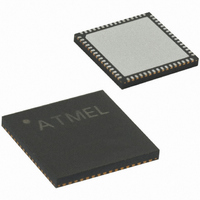ATMEGA128RFA1-ZU Atmel, ATMEGA128RFA1-ZU Datasheet - Page 162

ATMEGA128RFA1-ZU
Manufacturer Part Number
ATMEGA128RFA1-ZU
Description
IC AVR MCU 2.4GHZ XCEIVER 64QFN
Manufacturer
Atmel
Series
ATMEGAr
Datasheets
1.ATMEGA128-16AU.pdf
(385 pages)
2.ATAVR128RFA1-EK1.pdf
(13 pages)
3.ATAVR128RFA1-EK1.pdf
(555 pages)
4.ATMEGA128RFA1-ZU.pdf
(524 pages)
Specifications of ATMEGA128RFA1-ZU
Frequency
2.4GHz
Data Rate - Maximum
2Mbps
Modulation Or Protocol
802.15.4 Zigbee
Applications
General Purpose
Power - Output
3.5dBm
Sensitivity
-100dBm
Voltage - Supply
1.8 V ~ 3.6 V
Current - Receiving
12.5mA
Current - Transmitting
14.5mA
Data Interface
PCB, Surface Mount
Memory Size
128kB Flash, 4kB EEPROM, 16kB RAM
Antenna Connector
PCB, Surface Mount
Operating Temperature
-40°C ~ 85°C
Package / Case
64-VFQFN, Exposed Pad
Rf Ic Case Style
QFN
No. Of Pins
64
Supply Voltage Range
1.8V To 3.6V
Operating Temperature Range
-40°C To +85°C
Svhc
No SVHC (15-Dec-2010)
Rohs Compliant
Yes
Processor Series
ATMEGA128x
Core
AVR8
Data Bus Width
8 bit
Program Memory Type
Flash
Program Memory Size
128 KB
Data Ram Size
16 KB
Interface Type
JTAG
Maximum Clock Frequency
16 MHz
Number Of Programmable I/os
38
Number Of Timers
6
Operating Supply Voltage
1.8 V to 3.6 V
Maximum Operating Temperature
+ 85 C
Mounting Style
SMD/SMT
3rd Party Development Tools
EWAVR, EWAVR-BL
Development Tools By Supplier
ATAVR128RFA1-EK1
Lead Free Status / RoHS Status
Lead free / RoHS Compliant
Available stocks
Company
Part Number
Manufacturer
Quantity
Price
Part Number:
ATMEGA128RFA1-ZU
Manufacturer:
ATMEL/爱特梅尔
Quantity:
20 000
Company:
Part Number:
ATMEGA128RFA1-ZUR
Manufacturer:
ON
Quantity:
56 000
- ATMEGA128-16AU PDF datasheet
- ATAVR128RFA1-EK1 PDF datasheet #2
- ATAVR128RFA1-EK1 PDF datasheet #3
- ATMEGA128RFA1-ZU PDF datasheet #4
- Current page: 162 of 555
- Download datasheet (6Mb)
12.5 Supply Voltage and Leakage Control
12.5.1 Power-chain
Figure 12-1. Power-chain connections
162
ATmega128RFA1
The radio transceiver has a separate reset signal. A radio transceiver reset is initiated
by setting bit TRXRST in register TRXPR. This bit is self-resetting.
The radio transceiver signal SLPTR can be controlled by the bit SLPTR in register
TRXPR and is used to set the radio transceiver into SLEEP mode (assuming
TRX_STATE is TRX_OFF). This bit has a multiple function, see section
GHz Transceiver" on page 30
For battery applications using DEEP_SLEEP periods, the leakage current defines the
system life time. Due to the typical strong temperature dependency of the leakage
current, major contributors to the leakage budget are turned off:
• Analog and digital voltage regulator,
• Non-volatile memory (NVM),
• SRAM,
• Digital signal processor of the radio transceiver including AES engine.
If the CPU uses one of the sleep modes “power-down” or “power-save”, the above
mentioned blocks will be switched off by power switches. When the CPU wakes up, the
blocks are switched on again. There are some additional exceptions (internal voltage
regulator, SRAM, radio transceiver), see section
The supply voltage control is mainly hidden to the application, it is not necessary to
configure the supply voltage control. Nevertheless some configurations can be done in
order to get the maximum effect and the lowest sleep current, for details see section
"SRAM with Data Retention" on
The following figure shows the major dependencies of the power-chain and how the
power switches are situated inside the chain.
Startup and Wakeup from DEEP_SLEEP
After power-on reset (POR) or wakeup from DEEP_SLEEP the power switches of the
blocks will be enabled one after another (power-chained) to decrease current peaks.
The blocks will be enabled in the following order:
1. Bandgap reference and voltage regulator,
2. Digital voltage regulator (DVREG) and low leakage voltage regulator (LLVREG),
for a detailed description of the radio transceiver.
page 164.
"Power-chain" below
8266B-MCU Wireless-03/11
.
"Low-Power 2.4
Related parts for ATMEGA128RFA1-ZU
Image
Part Number
Description
Manufacturer
Datasheet
Request
R

Part Number:
Description:
Manufacturer:
ATMEL Corporation
Datasheet:

Part Number:
Description:
Microcontroller with 128K bytes In-system programmable flash, 8 MHz, power supply =2.7 - 5.5V
Manufacturer:
ATMEL Corporation
Datasheet:

Part Number:
Description:
IC AVR MCU 128K 16MHZ 5V 64TQFP
Manufacturer:
Atmel
Datasheet:

Part Number:
Description:
IC AVR MCU 128K 16MHZ 5V 64-QFN
Manufacturer:
Atmel
Datasheet:

Part Number:
Description:
IC AVR MCU 128K 16MHZ COM 64-QFN
Manufacturer:
Atmel
Datasheet:

Part Number:
Description:
IC AVR MCU 128K 16MHZ 64-TQFP
Manufacturer:
Atmel
Datasheet:

Part Number:
Description:
IC AVR MCU 128K 16MHZ 64-TQFP
Manufacturer:
Atmel
Datasheet:

Part Number:
Description:
IC AVR MCU 128K 16MHZ IND 64-QFN
Manufacturer:
Atmel
Datasheet:

Part Number:
Description:
MCU AVR 128KB FLASH 16MHZ 64TQFP
Manufacturer:
Atmel
Datasheet:

Part Number:
Description:
MCU AVR 128KB FLASH 16MHZ 64QFN
Manufacturer:
Atmel
Datasheet:

Part Number:
Description:
MCU AVR 128KB FLASH 16MHZ 64TQFP
Manufacturer:
Atmel
Datasheet:











